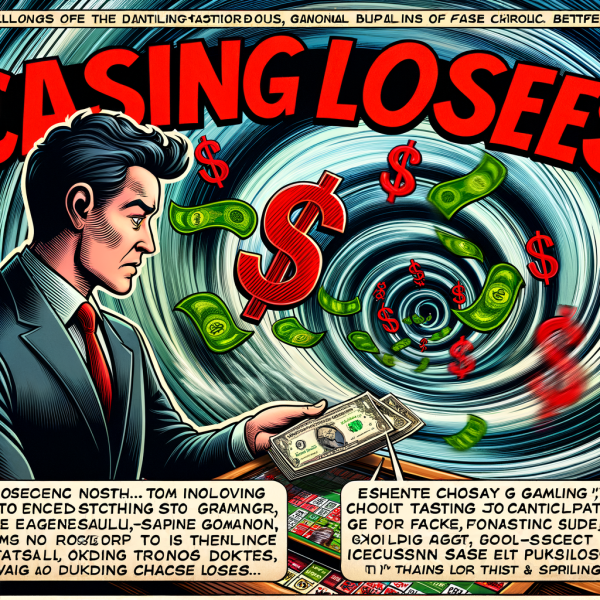Understanding the Psychology Behind Loss Chasing Behavior
Chasing losses is a common phenomenon in the world of gambling, where individuals continue to bet in hopes of recovering lost money. This behavior is often rooted in cognitive biases and emotional responses that cloud judgment. Many gamblers believe that a win is due after a series of losses, leading them to increase their stakes in an attempt to reclaim what they’ve lost. This belief is known as the “gambler’s fallacy,” where one mistakenly assumes that past events influence future outcomes in random games of chance.
Additionally, loss chasing can stem from a deep-seated need for validation and self-worth. Many individuals equate financial success with personal success, making losses feel like a blow to their self-esteem. The pressure to recover losses can lead to a cycle of risky behavior fueled by desperation. In many cases, the emotional turmoil that accompanies gambling can overwhelm rational thinking, pushing individuals to chase after losses even when the likelihood of success is slim.
Understanding the psychological drivers behind loss chasing is crucial for recognizing its potentially harmful effects. This behavior is not merely a financial issue; it is often intertwined with various psychological disorders, including anxiety and depression. Recognizing these patterns allows individuals to develop healthier coping mechanisms and strategies for dealing with losses, ultimately leading to more responsible gambling practices.
Ultimately, the psychology of loss chasing reveals a complex interplay between cognitive biases, emotional responses, and personal identity. By acknowledging these factors, individuals can better navigate their gambling experiences and make informed decisions.
The Illusion of Control: Why We Chase Our Losses
At the heart of loss chasing is the illusion of control. Gamblers often believe that they can influence the outcome of an unpredictable event, leading them to make increasingly risky bets. This illusion is exacerbated by the intermittent reinforcement of gambling, where occasional wins provide a false sense of mastery over the game. When faced with losses, the desire to regain control can compel individuals to raise their stakes, further entrenching them in a cycle of loss.
Research in psychology suggests that individuals are more likely to chase losses when they perceive themselves as capable of changing their fortunes. This belief can be particularly dangerous in gambling, where the odds are fundamentally against them. The brain’s reward systems respond to the pursuit of wins, igniting feelings of excitement and anticipation that overshadow the reality of the situation. Gamblers often overlook the statistical probabilities of their actions, focusing instead on their perceived ability to turn things around.
Moreover, social reinforcement plays a significant role in perpetuating loss chasing behavior. The gambling environment, often filled with cheering crowds and celebratory interactions, can amplify the illusion of control. Observing others winning can create a sense of urgency to replicate that success, leading individuals to chase after their losses in the hopes of achieving similar outcomes. This social dynamic can further obscure rational decision-making, pushing individuals deeper into the cycle of loss.
Recognizing the illusion of control in gambling is essential for breaking the cycle of loss chasing. By understanding that outcomes are determined by randomness, individuals can begin to detach their self-worth from their gambling experiences and adopt a more balanced approach to their financial decisions.
Cognitive Dissonance: Justifying Risky Decisions
Cognitive dissonance plays a pivotal role in the behavior of loss chasing. When individuals chase losses, they often experience a conflict between their desire to stop and their urge to continue betting. To resolve this discomfort, they may rationalize their risky decisions, convincing themselves that further gambling is a viable strategy for recovery. This rationalization can lead to a dangerous cycle where individuals become entrenched in their beliefs, making it increasingly difficult to step back and reassess their behavior.
The justification of loss chasing often extends beyond mere rationalization. Gamblers may adopt a “what’s done is done” mentality, viewing previous losses as a sunk cost that necessitates further investment. This flawed reasoning can lead to escalating bets and a willingness to risk even more, driven by the hope of recouping losses. The inability to accept losses as an inevitable part of gambling can trap individuals in a cycle of denial and desperation.
Furthermore, cognitive dissonance can distort an individual’s perception of risk. As they pursue losses, they may become desensitized to the financial and emotional consequences of their actions. This desensitization can lead to increasingly reckless behavior, as individuals become more focused on justifying their decisions rather than assessing their true risk.
To overcome the negative effects of cognitive dissonance, individuals must develop self-awareness and a willingness to confront their beliefs about gambling. By acknowledging the fallibility of their reasoning, they can start to make more rational decisions that prioritize long-term financial health over short-term emotional relief.
Emotional Responses: The Impact of Loss on Decision-Making
The emotional landscape of gambling is a significant factor in loss chasing behavior. Losses can trigger a range of emotional responses, including frustration, anger, and despair. These emotions can cloud judgment and lead to impulsive decisions, as individuals seek to alleviate their distress through further gambling. The emotional highs and lows associated with gambling create a volatile cycle that can perpetuate loss chasing.
Moreover, the fear of losing further can intensify emotional responses, creating a sense of urgency to recover losses quickly. This emotional pressure can lead individuals to take on greater risks, believing that a big win will restore their confidence and balance. However, as they chase losses, the emotional toll can become increasingly detrimental, leading to a vicious cycle of hopelessness and erratic behavior.
The impact of emotions extends beyond immediate decision-making; it can also affect long-term financial health. Emotional gambling can lead to significant financial losses, which can further exacerbate feelings of shame and guilt. This cycle can create a downward spiral, where individuals find themselves trapped in a cycle of loss chasing, unable to break free from the emotional turmoil of their decisions.
To combat these emotional responses, individuals must cultivate emotional intelligence and develop healthier coping mechanisms for dealing with losses. Practicing mindfulness and self-compassion can help individuals navigate their emotions more effectively, allowing them to make clearer and more rational decisions in the face of losses.
The Fallacy of Recovery: Are We Ever Truly Winning?
The concept of “recuperative gambling” is deeply ingrained in the psyche of many gamblers, who often pursue the idea of winning back their losses. However, the fallacy of recovery suggests that this mindset is fundamentally flawed. The reality is that the more one chases losses, the less likely they are to achieve a genuine recovery. Instead, loss chasing typically results in greater financial losses over time, creating a false sense of hope that can become addictive.
Individuals who chase losses often convince themselves that they are on the verge of a big win. They may develop elaborate strategies or systems to justify their continued gambling, despite evidence that suggests otherwise. This false hope can feed into a cycle of gambling that becomes increasingly destructive, as the reality of their situation becomes obscured by the pursuit of recovery.
Statistics show that the vast majority of gamblers do not win in the long term. The odds are stacked against them, and the house always has the advantage. By chasing losses, gamblers are essentially betting against themselves, undermining their chances of financial stability. This reality should serve as a wake-up call for those who believe they can recover losses through continued gambling.
Recognizing the fallacy of recovery is essential for changing one’s gambling behavior. By accepting that losses are a part of the gambling experience, individuals can develop a healthier relationship with gambling that prioritizes enjoyment and entertainment rather than financial recovery.
Strategies for Better Financial Decision-Making in Gambling
To break the cycle of loss chasing and make better financial decisions in gambling, individuals should consider implementing several strategies. First, establishing a strict budget is crucial. Setting limits on how much one is willing to gamble can help prevent emotionally driven decisions that lead to excessive losses. By treating gambling as a form of entertainment rather than a way to make money, individuals can adopt a healthier mindset.
Second, practicing self-awareness is vital. Gamblers should take the time to reflect on their emotional triggers and identify patterns of behavior that lead to loss chasing. Keeping a gambling journal can provide insights into one’s emotional state and decision-making process, helping individuals recognize when they may be about to chase losses.
Third, seeking support from peers or professional counselors can be invaluable. Many individuals benefit from discussing their experiences with others who share similar struggles. Support groups and counseling can provide individuals with the tools and resources needed to manage their gambling behavior more effectively.
Finally, exploring alternative activities can help individuals find fulfillment outside of gambling. Engaging in hobbies, sports, or social activities can provide healthy outlets for emotions and reduce the urge to chase losses. By diversifying their interests, individuals can create a more balanced and fulfilling lifestyle that does not revolve around gambling.
| Strategy | Description |
|---|---|
| Establish a Budget | Set strict limits on gambling expenditures. |
| Practice Self-Awareness | Reflect on emotional triggers and decision-making patterns. |
| Seek Support | Engage with peers or professionals for guidance and shared experiences. |
| Explore Alternative Activities | Diversify interests to reduce reliance on gambling for fulfillment. |
Q&A Section
Q: What is loss chasing in gambling?
A: Loss chasing refers to the behavior of continuing to gamble in an attempt to recover lost money, often resulting in further losses.
Q: Why do people chase losses?
A: People chase losses due to cognitive biases, emotional responses, and the illusion of control, which leads them to believe they can recover their money through additional gambling.
Q: Is there a way to stop chasing losses?
A: Yes, strategies such as setting a budget, practicing self-awareness, seeking support, and exploring alternative activities can help prevent loss chasing.
Q: Can loss chasing lead to addiction?
A: Yes, loss chasing can contribute to gambling addiction, as it creates a cycle of emotional turmoil and financial distress that is difficult to break.
Q: What should someone do if they find themselves chasing losses?
A: It is essential to recognize the behavior, set limits, seek support, and consider engaging in alternative activities to reduce the urge to gamble.





